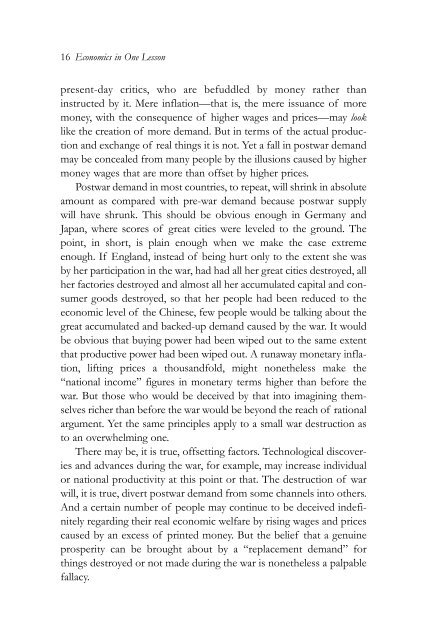1gDdM7w
1gDdM7w
1gDdM7w
- No tags were found...
Create successful ePaper yourself
Turn your PDF publications into a flip-book with our unique Google optimized e-Paper software.
16 Economics in One Lessonpresent-day critics, who are befuddled by money rather thaninstructed by it. Mere inflation—that is, the mere issuance of moremoney, with the consequence of higher wages and prices—may looklike the creation of more demand. But in terms of the actual productionand exchange of real things it is not. Yet a fall in postwar demandmay be concealed from many people by the illusions caused by highermoney wages that are more than offset by higher prices.Postwar demand in most countries, to repeat, will shrink in absoluteamount as compared with pre-war demand because postwar supplywill have shrunk. This should be obvious enough in Germany andJapan, where scores of great cities were leveled to the ground. Thepoint, in short, is plain enough when we make the case extremeenough. If England, instead of being hurt only to the extent she wasby her participation in the war, had had all her great cities destroyed, allher factories destroyed and almost all her accumulated capital and consumergoods destroyed, so that her people had been reduced to theeconomic level of the Chinese, few people would be talking about thegreat accumulated and backed-up demand caused by the war. It wouldbe obvious that buying power had been wiped out to the same extentthat productive power had been wiped out. A runaway monetary inflation,lifting prices a thousandfold, might nonetheless make the“national income” figures in monetary terms higher than before thewar. But those who would be deceived by that into imagining themselvesricher than before the war would be beyond the reach of rationalargument. Yet the same principles apply to a small war destruction asto an overwhelming one.There may be, it is true, offsetting factors. Technological discoveriesand advances during the war, for example, may increase individualor national productivity at this point or that. The destruction of warwill, it is true, divert postwar demand from some channels into others.And a certain number of people may continue to be deceived indefinitelyregarding their real economic welfare by rising wages and pricescaused by an excess of printed money. But the belief that a genuineprosperity can be brought about by a “replacement demand” forthings destroyed or not made during the war is nonetheless a palpablefallacy.


